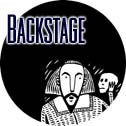
Comment
on this story
What:
The Cocktail Party by T. S. Eliot
When:
Thursdays, Fridays, and Saturdays at 8 p.m. through Dec. 16
Where:
The Black Box Theater, 5213 Homberg Drive
$8/$12. Call 523-0900 for reservations.
|
|

This Co-op show has a great writer but little punch
by Adrienne Martini
One of the better pieces of advice I got while I was studying this whole theater thing was that one should always be wary of a play that reads really well. Sure, some homilies handed to me had more practical applications—like "Never date an actor" and "Lefty-loosey, righty-tighty"—but aesthetic secrets about the act of picking a script on which to focus vast amounts of your (and your cast's and crew's) energies proved to be just as important in hindsight.
On the page, some really great scripts read like nothing more than loose outlines and strange collections of phrases rather than a fully developed story. Take, for example, Sam Shepard's True West. If your only exposure to this show was in printed form, you wouldn't really understand how unforgettable this puppy is when real live people speak those seemingly incomplete words aloud.
The converse holds true, though. A play that is a marvelously engaging read probably isn't a very good play. Too many of the story's outlines have been filled in and leave no room for the rest of the production team to add the flesh to the playwright's structural bones. Invariably, the resulting production plays like a collection of stiff lines (after all, none of us actually speaks in complete and meaningful sentences all of the time) and easy conclusions—which is really not what good theater should be.
T. S. Eliot, while he is arguably one of the best poets of the last hundred years, will not go down in the annals of history for his work as a playwright. Granted, his The Cocktail Party is technically well-written with passages that seem to be made of gossamer and weighty ideas. The opening passage, which contains at least half-a-dozen lines that any reader will recognize, is a beautiful piece of work. But for all that the script for The Cocktail Party is, what it isn't is a play.
Which—for those of us who lack Eliot's gift with the language—both sucks and blows, especially when produced by the Actors Co-op as the first show in their new space. While it is great fun watching some really wonderful actors romp about this versatile new theater, the evening as a whole gets a bit long (clocking in at two and a half hours) and you get really tired of Eliot wonking you on the skull with his painfully didactic symbolism. Again, on the page, it reads like a dream. Live, it feels like a well-acted passion play.
What this production of Party does have, however, is lots of passion on the part of the players. While the story itself is a surreal, cerebral journey into the ins and outs of marriage, the cast makes an intellectual exercise into a visceral one. Patrick McCray bounds around the stage with admirable exuberance; Fran Shea is close behind him, tempering her excitement with a measure of wisdom. Noel Smith and Barbara Stasiw are confidence made flesh and radiate an air of tender competence. While Andrew Miller has some of the dopiest lines in the play, he delivers them with sincerity, panache, and heart, and Robby Wright wraps his mouth around some of Eliot's most difficult phrases with knowledge and skill.
Two actors steal the show, as much as one can say that the show gets stolen by anyone, really. Joel Heller takes a write-in role as a servant and creates some wonderful comic business that rewards an observant audience member. Zack Allen's performance, however, is the one that stands out the most. Allen's nuance is remarkable—you could almost understand the whole show simply by watching the expressions his face makes. He brings an infectious joy to the show; he's having a great time up there and you should, too. Hopefully, we'll be seeing more of him as the new year wears on. Also stealing the show is Rob Link's hair design. Her skills with coiffures suggest wonderful-yet-hidden dimensions in each character, which is exactly what any good hair-do should, uh, do.
If only for the performances alone, The Cocktail Party is worth seeing and is somewhat satisfying. When you combine that with the remarkable work that the Co-op as an organization has done to open a new performance space, Party is certainly a piece of Knoxville that deserves your support and will repay you for it threefold. Eliot, though, is better appreciated when read on the page than experienced in a theater.

December 7, 2000 * Vol. 10, No. 49
© 2000 Metro Pulse
|